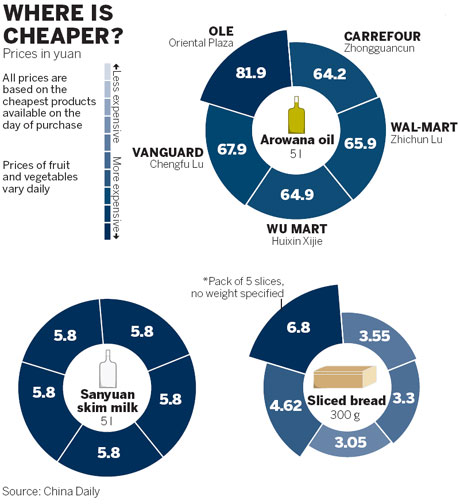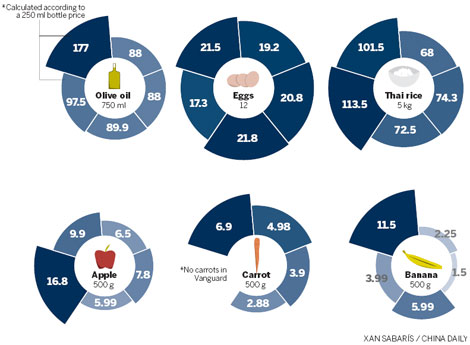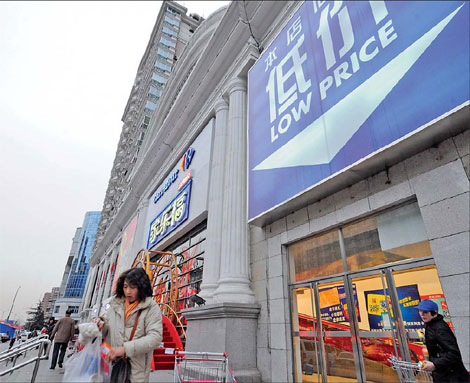Life
Scam victims refuse to stop their shopping
By Wang Wen and Liu Yujie (China Daily)
Updated: 2011-02-16 07:56
 |
Large Medium Small |
|
Beijing branches of Carrefour and Wal-Mart supermarkets have been fined for overcharging customers. provided to China Daily |
Supermarket shoppers in Beijing have grown more cautious about their purchases following a pricing scandal involving two of the world's largest chains.
Carrefour and Wal-Mart stores nationwide were recently exposed for overcharging at checkpoints, causing many experts to predict that customers would abandon the famous brands.
However, a simple study by METRO reporters found many people's opinions of the stores have been unaffected by the much-publicized scandal.
"I'll continue to get my food here because it's close to my home," said a South Korean woman surnamed Wong outside Carrefour in Zhongguancun, Haidian district. "I can walk home with plenty of stuff, which saves on travel expenses."
She said she had no idea whether she had ever been a victim of overcharging. "Although goods here seem to be more expensive than other supermarkets, I still prefer it," she added.
Similarly, a woman surnamed Chen in her 30s, who was shopping for home essentials like washing powder at Wal-Mart in Zhichunlu, Haidian, vowed to stick with the store as "it offers more choices" than domestic alternatives.
However, she admitted she has become more cautious about her purchases, especially discounted items, since the price-tag scandal was exposed. Many of the shoppers METRO reporters talked to at the stores expressed similar concerns.
The National Development and Reform Commission on Jan 26 announced that 11 Carrefour stores and three Wal-Mart stores had been discovered overcharging customers at checkpoints. Each store has since been fined up to 500,000 yuan.
Stores were accused of using misleading price tags, a claim that was reinforced in early February when Beijing investigators found that Carrefour in the capital's Fengtai district, which was not among the 11 stores fined in January, was still displaying tags printed in difficult-to-read typefaces that led shoppers to believe that a 169-yuan item cost just 16.90 yuan. The store was later fined 500,000 yuan.
Chen Bo, a representative for Carrefour China, said in an interview with Xinhua News Agency on Jan 30 that the company has established short-term and long-term measures to address the issue.
"We'll have our special control group conduct internal price inspections, with wide coverage and high frequency," he said, adding that a refund policy will be permanently implemented at all 182 outlets across China, with non-implementation regarded as a violation of corporate rules.
Despite the pledge, marketing experts still predicted that the scandal would seriously dent the brands' images.
"This will have a very negative effect on shoppers," said Zhang Shuting, a professor of advertising at Communication University of China who specializes in brand marketing and consumer behavior. "The incident will definitely harm the companies' credibility among the consumers, who may no longer trust them in the future.
"With some previously loyal customers choosing to shop elsewhere, they are effectively boosting their competitors' business. What's worse, they will suffer from an unfavorable image for some time."
One shopper who has decided to make the switch is Guo Yue, 59, who now takes her business to domestic stores or free markets close to her home in Haidian.
"I used to shop at Carrefour and Wal-Mart sometimes and take advantage of their discounts, but after hearing about the overcharging tricks I started to think all the discounts might be fake," said Guo. "I'm going to use traditional markets rather than supermarkets. At least I know how much I'm paying for every item exactly."
Yang Hongcan, a spokeswoman for the China Consumers' Association, said there are many loopholes in the supervision of the country's retail market, which still lacks a unified and strict system.
She said there are many methods used by supermarkets to trick careless customers, including raising the original prices, differing the prices on the shelves from those at checkout counters, posting misleading advertisements and inflating the prices of some items to make customers feel they were getting greater discounts.
"Consumers should go through shopping receipts after paying and keep them for some time in case they find something wrong later," Yang said, adding that worried consumers can call 12358 for assistance.


| 分享按钮 |
